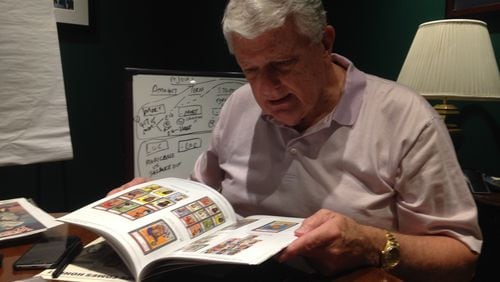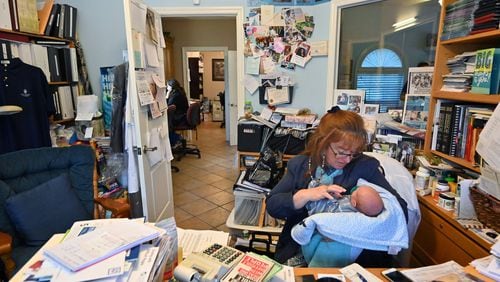Ross Greene has held onto the more coveted and valuable of baseball cards for 21 years, keeping it a secret to all but family and a few friends and stashing it in his sock drawer. But Greene, a Peachtree City resident and serious baseball-card collector, is relinquishing his Honus Wagner “T206” card, a 108-year-old card believed to be one of perhaps 60 in existence.
Greene, a 76-year-old married father of three and grandfather of eight, said that he tried to be pragmatic about letting go of a treasure.
“I don’t think they collect baseball cards in heaven,” said Greene, a financial services consultant. “So you’ve got to part with things at some point in time. I thought this was a good time.”
The Wagner card is part of a collection of more than 100,000 cards and memorabilia that Greene, is auctioning off. He plans to use the proceeds to provide for his retirement, help fund the education of his grandchildren and to support a variety of Christian ministries.
Other parts of the collection include Mickey Mantle's 1952 rookie card, considered the second most prized card after the Wagner card, and several complete and near-complete sets of baseball and football cards from the 1950s and '60s, a Babe Ruth autograph and rookie cards of Hall of Famers such as Hank Aaron, Sandy Koufax and Roberto Clemente. The collection can be reviewed on the SCP Auctions website.
“I think it’s probably excellent timing on his part,” said Joe Davis of GotBaseballCards.com in Snellville. “The card market is very strong right now. There’s a lot of money being poured into the card industry.”
Greene’s collecting habit has a familiar beginning. Growing up in Knoxville, Tenn., in the ’40s and ’50s, Greene bought cards with money saved from mowing lawns and running errands for a neighbor. In an age when television was just beginning to spread, the cards provided a connection to major-league players he could only hear about on the radio or read about in the newspaper.
Greene believes he amassed a collection of perhaps 2,500 cards, stored in a shoebox. But about 30 years later, he went back home to retrieve them, only to learn his parents had tossed them out. He suspects they might be worth between $500,000 and $1 million today.
Dismayed, Greene bought a friend’s old collection of about 3,000 cards for $500. In the early ’90s, when the card market began to pick up and he realized that the value of his friend’s collection had increased several times from his purchase price, he began to buy other collections to put together sets from the ’50s and ’60s.
“I’m a fastidious, anal guy, so I had everything listed and in boxes and in books and in order and by collectible value and what have you,” Greene said.
Greene is not one to pursue an interest halfway. He spent years researching the military service of his uncle, who was a World War II bombardier, traveling across Europe and interviewing more than 200 veterans, for a historical novel. (He encapsulated the process in a story for the AJC's Personal Journeys feature last November.)
In 1996, Greene saw an ad in a collecting magazine publicizing the auction of the rare Wagner card.
The card is prized because of its scarcity. The set’s cards were included in packs of cigarettes, and Wagner, a Hall of Famer who spent most of his career with the Pittsburgh Pirates, demanded that his card not be included, limiting distribution. Lore suggests it was either because he was opposed to smoking or because he wasn’t compensated enough for the usage of his likeness.
Greene called into the phone auction, which he said had reached $37,000. He made one bid, which was surpassed. At the time, the Greenes were building a house and their daughter, Meredith, was about to get married. He called his wife, Lynne.
“It was the worst time in the world to think about doing what I was doing,” he said. “So I figured it was in a situation where I needed to ask permission rather than to try to get forgiveness later on.”
She gave her blessing, and what he determined would be his final bid, $48,500, proved successful. Greene said he has taken pride in owning such a prized piece of the hobby. He kept it in a blue-felt wrapper in a pair of brown socks, occasionally bringing it out to show relatives or friends.
He realized, though, that the time had come to return it to the market and give someone else a chance to own it.
“It’s been fun owning it, and I’ve enjoyed it,” he said. “No matter what happens, you can’t take away from the fact that I owned something that was very rare and hopefully will put the proceeds to decent use.”
The Wagner card has increased in value since. In October of last year, the card argued to be in the best condition in existence, rated a 5 on a 10-point scale, sold for $3.1 million. Greene’s card is rated a 1 — most in existence are 1 or 2, according to SCP vice president Dan Imler, a card expert — but it also has a unique story to tell.
Its chain of custody can be traced to its original owner. Greene is the fourth to possess the card. The first three were sports writers. The third was named Bill Haber, a longtime Topps employee and baseball researcher who wrote the copy on the backs of baseball cards. Greene and the SCP auction house are hopeful that the card’s verifiable authenticity and lineage of ownership will spur interest.
Bidding on the card opened May 24 at $100,000 and had reached $313,842 as of Tuesday afternoon. Imler expected that the card will bring in more than $500,000 and perhaps even reach $1 million. The remainder of the collection could net $500,000. Initial bidding ends June 10.
“I hope somebody that gets it enjoys it and has a passion for collecting and is not prideful, but takes stewardship, feels good about owning it, as opposed to it just being a money issue,” Greene said. “But, obviously, I’d like to have as much as money as I (can). So it’s the yin and the yang.”







